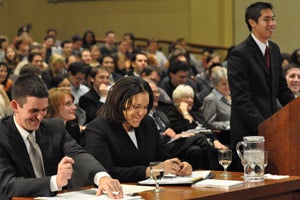The final round of Harvard Law School’s annual Ames Moot Court Competition was held on November 16, 2009, in Ames Courtroom.
Richard A. Posner, of the United States Court of Appeals for the Seventh Circuit, presided as chief justice. Joining him on the panel were Diane P. Wood of the U.S. Court of Appeals for the Seventh Circuit and Barrington D. Parker of the U.S. Court of Appeals for the Second Circuit.
“We were very, very impressed by the quality of briefs and the arguments, and the preparation that obviously you’ve put into it,” said Judge Posner before announcing the final results. “It’s a truism…that the quality of the briefs and arguments are far superior to those heard in our courts. It was a very difficult choice.”
[Watch the webcast]
“I don’t want any of you leaving here thinking that in any meaningful sense, you are first or second,” said Judge Parker, echoing Posner’s thoughts. “You all did just a wonderful job. These were reflective of so much effort and thought. For third year students, you are all extremely precocious and extremely able. You should all be extremely proud of yourselves.”
For the written materials of this year’s competition, including the case record and the student briefs, visit the Board of Student Advisers website.
Taking the side of the petitioner, the Clarence Darrow Memorial Team, with Kathryn Nielson ’10 and Ray Seilie ’10 as oralists, upheld the position that restricting HACA’s license plate was acceptable because the license plate was government speech and because the restriction of the plate, which stated “meat is murder,” was content neutral.
In questioning the first oralist for the petitioner, Judge Wood asked why the license plate program ought to be considered government speech. Invoking the recent Supreme Court Case Pleasant Grove City v. Summum, in which restricting a privately donated monument in a public park that included one of the Ten Commandments was deemed to be constitutional, Wood pushed Nielson on why that case ought to apply in this instance.
“We recognize that there is not the same physical limitation,” said Nielson. “We do believe that the managerial concerns of any government program require that Ames not be required to open it up to the infinite number of plates that would result in viewpoint neutrality.”
Candyce Phoenix ’10 and Hagan Scotten ’10, who represented respondent as part of the Charles Sumner Memorial Team, argued that the license plate program allowed individuals to speak through license plates and so, the license plates were not government speech. Moreover, they argued that in not allowing the HACA’s license plate, the government discriminated on the basis of viewpoint.
In questioning Scotten, Wood asked how a small license plate could be a legitimate forum for free discussion. There are plenty of opportunities for freedom of expression on vehicles, including bumper stickers, Wood said.
“This court, I think rightly, hasn’t tolerated small infringements just because the speaker could speak elsewhere,” Scotten said in reply. “Certainly, if HACA was banned in only one park in all of America, it would have no significant effect on their ability to propagate their message. We still wouldn’t tolerate that on the basis of principle.”
Although the judges peppered the oralists with questions about serious constitutional issues in rapid-fire fashion, there were a few light-hearted moments as well. At one point, in questioning Seilie about why the state of Ames allowed a license plate saying, “save Lemurs,” Judge Parker asked, “But then we circle back to lemurs, and we are just confused…what is a lemur anyway?”
“I think a lemur is a type of tailed monkey that is usually found in Madagascar, your Honor,” Seilie replied.
As the courtroom erupted in laughter, Judge Wood asked, “And, that really helps Ames how?”
“It’s unclear why, your honor. There might be a lemur population in Ames – I’m not entirely familiar with the ecology there. The record doesn’t contain any information about the lemur population in Ames,” Seilie said.
“I’d like to take judicial notice that Madagascar is quite a long way away from Ames,” Judge Wood said.
“It’s a zoo animal,” Judge Posner explained, as the audience continued to laugh.
The 2009 Final Round competitors were:
The Clarence Darrow Memorial Team (Petitioner):
- Paul Bailin ’10
- Ryan Buschell ’10
- Nicolas Cornell ’10
- Kathryn Nielson ’10, Oralist
- Ray Seilie ’10, Oralist
- William Sullivan ’10
The Charles Sumner Memorial Team (Respondent):
- Anna Fecker ’10
- Candyce Phoenix ’10, Oralist
- Colleen Roh ’10
- Hillary Schrenell ’10
- Hagan Scotten ’10, Oralist
- Tobias Tobler ’10
The judges recognized the Charles Sumner Memorial Team as best overall team, Scotten as best oralist, and the Clarence Darrow Memorial Team for best written brief.
The Ames Moot Court Competition was established in 1911 as the result of a bequest by the late Dean James Barr Ames. The Board of Student Advisers is charged with administrating the Competition, and the competition takes place in three rounds, beginning with the Qualifying Round (held in the fall of competitors’ 2L year), followed by the Semi-Final Round (held in the spring of competitors’ 2L year), and culminating in the Final Round (held in the fall of competitors’ 3L year).
